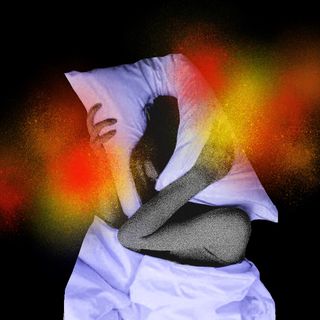
The Issue With Seeing PCOS As Just a ‘Period Problem’
People think of PCOS as a purely physical problem that occurs a few days a month, as opposed to a chronic condition that reduces the overall quality of life.

“I constantly feel like I’m a fat waste of space.” These were the exact words Rekha*, 23 said when asked about her mental health during my consultation with her.
As a gynecologist in Mumbai specializing in polycystic ovary syndrome (PCOS), I see a considerable number of women suffering from PCOS regularly. She then shared how that made her feel constantly anxious and not just about her looks but how she felt inside. “I don’t think I’ve been happy in a long time, a lot of times I just feel nothing.”
Although PCOS has started gaining recognition as a problem now faced by many women and we are even getting closer to normalizing the diagnosis of PCOS, it is still mostly thought to be a period problem. Even the name itself makes it sound like primarily an ovary issue. PCOS has strongly cemented itself as an issue that concerns irregular periods — that’s it. However, in reality, it’s so much more pervasive than that.
When it is positioned as a “period problem,” people think of it as a purely physical problem that occurs a few days a month, as opposed to a chronic condition that affects one’s mental health and reduces the overall quality of life.
The long-term complications of PCOS – like insulin resistance, Type 2 diabetes, dyslipidemia, heart disease, and infertility – are far-reaching and devastating. Adding to this, people with PCOS have a higher rate of developing mental health disorders, such as anxiety, depression, mood disorders, and eating disorders.
Anahita* 19 was so distressed about her hirsutism (hair growth on the face), and at the same time, hair fall issues that stemmed from PCOS, sharing that she had stopped going out with her friends because she felt ugly in front of them.
Most women are diagnosed in their late teens or twenties, which makes the threat of gaining weight and future infertility very difficult to cope with.
Related on The Swaddle:
Many women with PCOS reported fatigue and brain-fog like symptoms, especially around their periods, making daily activities extremely challenging and further impacting their quality of life.
In her early twenties, Bina* 21 started feeling weakness, fatigue, and sleepiness not just around her period but chronically. She would wake up tired and go to sleep tired, no matter what she did. Parents and other doctors told her that she was just being lazy and that she needed to exercise and lose weight. But she just could not shrug off these symptoms.
Women with PCOS are also unfortunately predisposed to obesity and lipid issues, which are exacerbated by insulin resistance and make it very difficult to lose weight. Coupled with the other debilitating symptoms of PCOS, like acne, hair loss, and hirsutism, the difficulty of losing weight makes women highly susceptible to body image issues and eating disorders.
Sheila* 27 describes the mood swings she experienced during and even before her period as “one minute, I was feeling good about myself, the next I was stress-eating anything I could get my hands on.” Further, being ridiculed for her weight and eating habits made her feel like her PCOS was her fault and she wasn’t doing anything to help it.
Pavitra* was diagnosed with Type 2 diabetes at the age of 24 when she went in for a regular check-up for her PCOS. She had to switch to a diabetic diet, change her entire lifestyle, and also take daily medications for her diabetes. She felt incredible shame that she was a diabetic, a disease that affects old people at such a young age. This made it highly difficult for her to talk to any of her friends or family about what she was going through. Suffering in silence had a large impact on her mental health, leading to bouts of depression and reducing her general quality of life further.
Insulin resistance has also been linked to higher than normal incidences of mental health disorders, although it is not clear why. One theory posits that it could be because insulin resistance changes how the body makes hormones, causing prolonged stress and eventually mental health issues.
Despite the number of patients I saw the mental health fallout of PCOS in, there are hardly any Indian studies exploring this link.
Therefore, I conducted a study analyzing the impact of PCOS on the mental health of women in their in late-teens and twenties, which is when PCOS most commonly develops and is diagnosed. I interviewed 100 young women over the age of 18 who had already been diagnosed with PCOS. In order to not bias the study’s results, I excluded people who had any previous psychological illness, substance abuse, or who were going through other emotional upheavals.
The results of the study more than confirmed my suspicion that Indian women with PCOS were facing massive mental health challenges. 38% of these women were suffering from some kind of anxiety disorder and 18% were screened positive for a depressive disorder; this is significantly higher than the average prevalence of mental health disorders in India (4.7%).
This basically means that women with PCOS have an almost 7x risk of developing anxiety disorders and a 3x risk of developing depression than women without PCOS, which is hugely significant. The study also showed a considerably lower quality of life in women with PCOS, which was worse when they also had a mental health disorder.
Although these numbers are very similar to studies done in the United States, no such study has been done in India before, making this a hallmark study.
Related on The Swaddle:
Cultural Trauma Affects PCOS Patients’ Sex Drive More Than The Condition Itself
While these numbers are high, what makes them truly alarming is that a lot of the times, the symptoms are ignored or pushed under the rug, like most mental health issues are. Women’s mental health issues are mostly ignored and mislabelled as “drama” or “hormonal issues” and they are being told that it’s just “that time of the month.”
Tara*’s parents refused to believe her PCOS diagnosis. They attributed her mood swings and irritability to teen drama and dismissed the irregular periods as normal because she was a teenager. Even when women manage to get PCOS diagnoses, their Indian families find it hard to accept and support them due to expectations of marriage and childbirth, which are complicated for women with PCOS. Further, mental health issues, in general, are looked down upon in Indian families, making it very difficult for women to open up to family and friends, leading to isolation. From difficulty in asking for help and accessing adequate mental health care to the stigma associated with taking psychiatric medication, women with PCOS face many additional hurdles to receiving care.
Although there is no conclusive research on why PCOS presents with mental health disorders, there are some research-supported hypotheses. More than 50% of women with PCOS have insulin resistance (regardless of their weight), which basically means their cells cannot absorb and use glucose as they should, leading to lower energy levels and fatigue. Chronic stress and inflammation are seen in PCOS because of the increase in the stress hormone cortisol as well as inflammatory markers in the body. This also leads to an increase in insulin resistance and more mental health issues.
Research examining the correlation between PCOS, mood disorders, and quality of life is important as it validates countless women going through this. At the same time, it also helps in furthering research into finding the right management and preventative measures for these issues.
As doctors, we need to sensitize ourselves to understand that PCOS is more than just a period problem and that mental health and quality of life are crucial to look at as well. Healthcare providers need to be more proactive about identifying mental health disorders in women with PCOS by asking probing questions about their mental health in regular consultations and screening women at high risk for mental health disorders. It is also important to increase awareness about mental health in women with PCOS, so women can demand mental healthcare for themselves. Doctors can facilitate this by providing resources at clinics or through social media to ensure that women are aware of the risks they face.
Such measures will also work toward helping women feel less alone. Isolation breeds fear and feelings that what one is going through is not normal and only happening to them. This isolation can often make it harder to break away and seek help.
My aim for this study and in my work to spread awareness about women’s health is to make it okay for women to ask for help and empower them to make evidence-based decisions about their health.
* Names changed to protect anonymity.
Dr. Esha Chainani is an Obstetrician and Gynaecologist practicing in Mumbai. She advocates for the availability of quality healthcare for all women.
Related


Why Some People Hear Loud Noises While Trying To Fall Asleep
